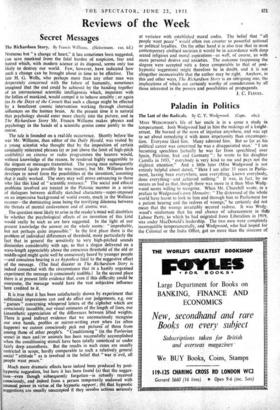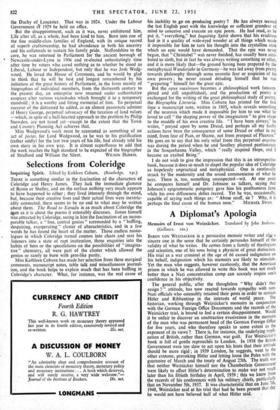Paladin in Politics
The Last of the Radicals. By C. V. Wedgwood. (Cape. t6s.) Miss WED WOOD'S life of her uncle is in a sense a study in temperament. Josh Wedgwood had in him the makings of a knight- errant. He burned at the news of injustice anywhere, and was apt to set about remedying it with more impetuosity than circumspec- tion. Everyone liked him. Many admired him. But so far as his political career was concerned he was a disappointed man: "I am becoming speechless [actually he was far from speechless] over Spain, Palestine, Irak and Germany " ; he wrote to his daughter Camilla in 1933, " everybody is very kind to me and pays not the slightest attention." And a little later (Miss Wedgwood is not entirely helpful about dates), " Here I am after 33 years in Parlia- ment, having been everywhere, seen everything, known everybody, done everything—and achieved nothing." It was, in fact, by no means as bad as that, though there was more in it than Miss Wedg- wood seems willing to recognise. When Mr. Churchill wrote, in a preface to Wedgwood's own Memoirs: "The distressed of the whole world have learnt to look to him and through him to Parliament for a patient hearing and the redress of wrongs," he certainly did not mean that the wrongs invariably secured redress. It was Wedg- wood's misfortune that his real chance of advancement in thav Labour Party, to which he had migrated from Liberalism in 1919, was under NlacDonald's leadership. The two men were completely incompatible temperamentally, and Wedgwood, who had hoped for the Colonial or the India Office, got no more than the sinecure of the Duchy of Lancaster. That was in 1924. Under the Labour Government Of 1929 he held no office.
But the disappointment, such as it was, never embittered him. Life after all, as a whole, had been kind to him. Born into one of the fine middle-class families of England, with its unique record of superb craftsmanship, he had abundance in both his ancestry and his collaterals to sustain his family pride. Staffordshire to the core, he was returned to Parliament for the ancient borough of Newcastle-under-Lyme in 1906 and re-elected unhesitatingly time after time by voters who cared nothing as to whether he stood as Liberal, Labour or Independent, but only that he was Josh Wedg- wood. He loved the House of Commons, and he would be glad to think that he will be best and longest remembered by his initiation of the great history of Parliament, in the form mainly of biographies of individual members, from the thirteenth century to the present day, an enterprise now resumed under authoritative auspices after various vicissitudes which brought it to a temporary standstill ; it is a worthy and fitting memorial of him. To perpetual succour of the distressed he added, as an almost passionate admirer of Henry George, perpetual advocacy of the taxation of land values —which, in spite of a half-hearted approach to the problem by Philip Snowden, are not taxed yet—except to the extent that the Town and Country Planning Act achieves that.
Miss Wedgwood's work must be accounted as something of an act of pietas. for Lord Wedgwood, as he was to his gratification (rather oddly) for the last two years of his life, had already told his own story in his own way. It is almost superfluous to add that the work reaches the high standard to be expected of the biographer of Strafford and William the Silent. WILSON HARRIS.



















































 Previous page
Previous page